 This entry and the next contain the text of a May 13, 1999 after-dinner speech I delivered at the Kronos Worldwide Sales and Service Conference ("WWSSC") in St. Louis, Missouri, to an audience of over 800 people. During 1998 and 1999, I spent much of my time working on the so-called "Y2K" problem, to ensure that Kronos products would operate properly at the turn of the millennium and beyond. I discussed this effort in two previous blog entries, Y2K and Y2K (bis). The speech is copyright 1999 by Lawrence J. Krakauer. The footnotes include information to help non-Kronos readers understand my references, some of which were topical, and some of which would have been understood only by employees of the company. The photographs depict various moments in the speech. Note 1 Ladies and Gentlemen, good evening, bonsoir, buenas noches. I trust you have all completed the assignment I gave you in my speech two years ago, and have learned French and Spanish. So we've added another language. Aos nossos amigos do Brasil: boa noite e bem-vindos à Kronos. The rest of you: your assignment for next year: learn Portuguese! Note 2 Well, last time I got an all-expense paid trip to Chicago, and now St. Louis! My cup runneth over! After my talk to this meeting two years ago, my wife Margie was delighted to hear how well it went, until I mentioned that after the speech, certain women who shall remain nameless were asking me to autograph various parts of their bodies. So Margie came along with me this year. You guys travel enough to get sick of it, but I dream of exotic destinations like Saint Louis. The closest I've come recently was when Laura Woodburn returned from two weeks on the road. She said "Here, Larry, have an airline snack", and she tossed me a bag of pretzels. She must have missed the sign that says "Please don't feed the Engineers". Note 3 But now, I'm an experienced world traveler myself, and after only one trip, because it took me thirteen hours to get to St. Louis yesterday on American, via thunderstorm-plagued Chicago, on two "Beverage-service only" flights. It was brutal; the passenger to my right got eaten. In that time, I could have flown to Paris. Twice. 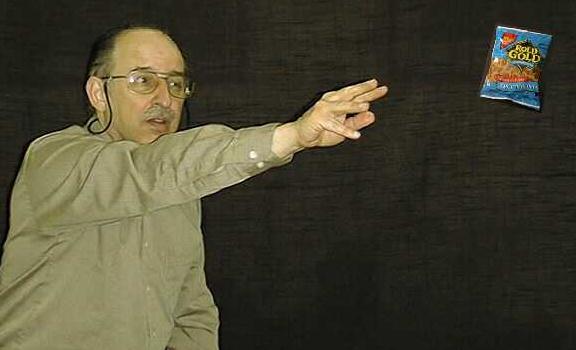 But here I am, and I had no trouble picking a topic for this speech. There are now three things in life that you can't avoid: Death, taxes, and the Year 2000. With inheritance taxes, you can't even use Death to avoid Taxes, although you can use Death to avoid the year 2000, but only if you act quickly! Anyway, we finally know why the chicken crossed the road: to sign up for COBOL classes. Note 4 In case anyone here has been in a cave for the past year: The Year 2000 Problem, abbreviated "Y-2-K", refers to the possibility that when the calendar rolls from 1-9-9-9 to 2-0-0-0, computers will start acting even stupider than usual. This is due to dates stored with only two digits, and other date-related bugs. And Time and Attendance software, of course, is just crawling with dates. We could look through all our code, but you know how hard it is for a programmer to find a date! Anyway, I'm the Engineering representative to the Kronos Y2K Steering Committee, an honor bestowed on me because I didn't get out of the way fast enough. The Year 2000 problem is so serious, I'm sure you're all thinking the same thing I did: we need to celebrate it in song! While trying to write a humorous speech, I discovered that whenever I mentioned to anyone that I was thinking about singing, they immediately started laughing! Now, if I'd already heard Aron and Kizzy sing, I would have thought twice, but it's too late to turn back now. And so, to accompany me, I'd like to call on longtime Kronite Steve Hiatt, who has often provided musical accompaniment at management roasts, and other solemn Kronos occasions (and you know how solemn Steve is). Note 5 Well, date problems are no longer just a curiosity, because we're rapidly approaching Anno Domino 2000. Anno Domino ("A.D") is Latin for "The Year of Our Lord", and while we may say just "99", The Year of Our Lord actually has four digits in it! 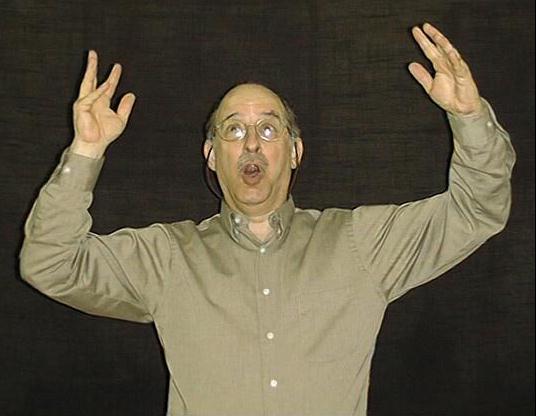 Mine eyes have seen the glory of the coming of the Lord,
[Chorus:]
I've inspected all our software, with ten thousand stinking dates.
[Words of chorus appear on screen]
Glory, glory Hallelujah!
And when this year is over, will the battle have been won?
One more time:
Well, that was sterling. Maybe next year we'll get Bruce Bell up here to dance. He was recommended by some place called the Giggling Marlin in Los Cabos, Mexico. Note 6 Anyway, what might this "Year 2-K" problem do? After January first, 2000, it might take upwards of fifteen minutes to download a nude picture of Pamela Anderson on the World Wide Web. Well, maybe only ten minutes, now that she's had her breast implants removed. Also, TKC will experience data corruption, the Intellisys C/S product won't work properly, and IDI will be unresponsive. Come to think of it, things will be about the same as they are now. Note 7 The Year 2000 problem started early in the Renaissance, if you'll cast your minds back. In the 1500's, the longest day of the year was ten days late. Pope Gregory the thirteenth put his astronomers to work on it, and they developed what we now call the "Gregorian Calendar". Of course, Gregory took the credit for it, because he was the Pope, just like Mark Ain gets to take credit for any good ideas that come out of Engineering. Note 8 Well, the Renaissance went on to produce all sorts of tremendous advances in science, philosophy, literature, and paintings of naked women, so it's obvious that it led directly to the Polaroid camera, the VCR, and eventually to the World Wide Web. But the Gregorian calendar is now embodied in software, except some of it will screw up when the century turns. Of course, people should have thought of that when they wrote the software in the first place, but they had more important things to worry about, like e-mailing chain letters, and thinking up company names ending in "dot com". Except, if I may boast a bit, I was thinking about it! I invented the so-called "EAT" time, E-A-T, "Expanded Absolute Time", sometimes called a "Kronos Raw Date", to use in this original timeclock here. With that format, you don't care if a date is in the 1900's or the 2000's. [Picks up a timecard, stands poised with the card over the card slot] Maybe we should set the time to the year 2000, and give it a try. Note 9 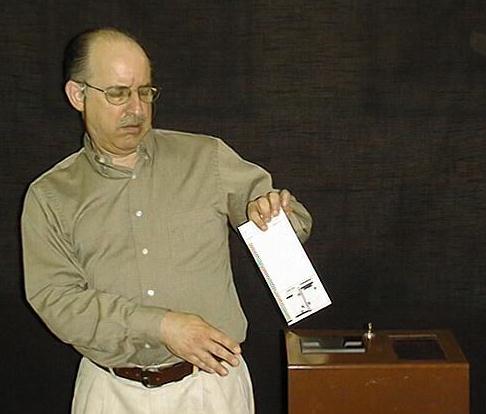 But Kronos has lots or products, and bugs can still creep in. So our customers demand that we test them, and that's what we've been doing. People make a big deal out of Y2K testing. You just set the date forward, and see if it still works. For example, on this laptop here: [pretend to be doing the operations] I just click on "Start", "Settings", "Control Panel", then I double-click on "Date/Time", and it comes up with the "Date & Time" tab selected. Now I just click the year up to "2000", and finally click the "OK" button…. [There's a "boing" sound, and the cover of the laptop drops off and dangles in front of the table.] 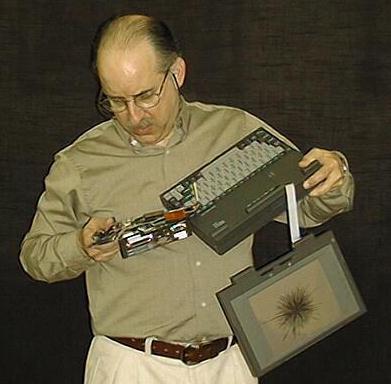 Hmm, maybe I should have upgraded the BIOS on this one. [Looking at one of the boards] Gee, here's the BIOS chip right here. Anyway, see? That was easy; we've tested it. It takes less time when it flunks right at the beginning. We spare no expense in our year 2 K research. For accuracy, we go right to the source. For example, people say that the year 2000 is a leap year, but how can we really be sure? Well, remember, the original source, the "horse's mouth", so to speak, was Pope Gregory the thirteenth. So we wrote to the Vatican to get a copy of the original proclamation. In fact, the reply just came in! Let's see: [Pulls out official-looking letter, with a seal, a ribbon, etc.] [Reads] Inter Gravissimas, MDLXXXII [Mumbles] M is a thousand, D is 500, put down the L, carry the X, ... [Loudly] Fifteen eighty two! Inter Gravissimas, 1582. Anyway, what's it say? Yup, we spare no effort in our quest for accuracy! [Clears throat, reads] 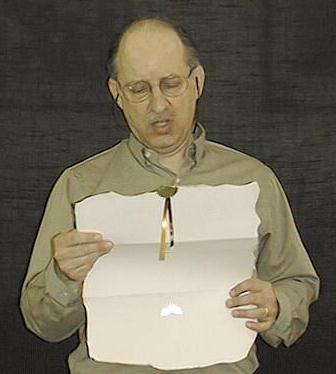 Damn, it's in Latin! [throws proclamation away] Well, screw that. Kronos has been testing all its products, and reporting on the test program on our web page. It's very important for Kronos to speak with one voice on the Y 2 K problem; if people ask, you should refer them to our home web page at www.kronos.com. Tell them to click on the "Year 2000" graphic on the first page. [Speaker claps] Wake up! This is the serious part of the speech. The web page is our official Y 2 K statement. Just keep referring people to the web page. Don't put anything in writing about Y2K, and don't say anything about Y2K. If you do, you may be putting the company at risk, and actually yourselves too, because you don't have the authority to make statements about compliance. Your mantra should be "See the web page", "See the web page", "See the web page". Read the web pages yourself. You'll notice we aren't testing Custom software, and we're starting to link to the pages of some of our third-party software providers, like IDI. At the bottom of the Product Identification page, there's a link "Contact Us" which takes users to a form they can use to ask us about anything they can't find. The wording in these pages has been carefully thought out. It doesn't say "It's compliant"; it says "It was tested and passed." If a product was not tested, we don't say "It's not compliant", we say "It wasn't tested". And every page contains the words "Year 2000 Readiness Disclosure"; this is a magic legal incantation that, per a Federal law, can reduce our exposure to future legal action, as long as the Y2K information presented is believed accurate, and is being provided in good faith. Kronos Corporate has mailed out thousands of letters notifying customers who hold either non-compliant or untested Kronos products. You can see these letters, and when they were mailed, on the Sales and Service web site; click on "Marcom", then "Y2K Notifications". Kronos employees on Outlook can see complete lists of who the letters were mailed to in Outlook's Public Folders, way at the bottom under "Y2K Notification Lists". And when customers contact the Y2K Group in Chelmsford to talk about an upgrade, a record of the contact is faxed to the appropriate industry manager. Just between you and me, in this intimate gathering, if customers send e-mail to the address Y2K@kronos.com, and ask about testing, we'll send them a non-disclosure agreement, and if they sign and return it, they can see the scripts we used in our testing. But please don't encourage this; only mention it if the customer asks. Sending out these scripts is becoming a burden. And as the non-disclosure agreement makes it clear, the scripts were made for our own test effort; they are difficult for an end-user to use, and we can't give any help. Well, I've got a new job after January first: Expert Witness! The lawyers think that the Year 2000 is the best thing to come along since silicone breast implants. Wouldn't you know the lawyers would make something out of this; hey, "Same shit, different millennium." Kronos is a Massachusetts corporation, and Massachusetts has tons of lawyers, sort of like New Jersey has toxic waste. Why did New Jersey get the toxic waste, and we got the lawyers? 'Cause they got to pick first. I caught a nasty virus from Alyce Moore in our legal department. It was a computer virus, of course, one of those "Melissa" Word macro things. You know, these days, when you get a message from someone, it's like getting a message from everyone they've ever gotten a message from. I told her she's got to start practicing "safe text". But of course, we appreciate lawyers when they're on our side, and I've gotten a great deal of help on Y2K from our Kronos attorneys, John DeLuca and Alyce Moore, and particularly Sally Wallace, who's taught me the art of thinking twice before saying nothing. Note 12   Note 1: In the interest of full disclosure, so important in someone who worked on the Y2K problem: the photos shown here were not actually taken at the speech. Rather, they are 100% genuine reenactments. The sharp-eyed viewer might notice the absence of the lavaliere microphone I wore during the speech. But I did put on the same shirt (well, I'm an Engineer; I've only got one shirt). [return to text] Note 2: The Portuguese sentence "Aos nossos amigos do Brasil: boa noite e bem-vindos à Kronos" means "To our friends from Brazil: good evening, and welcome to Kronos." I was able to pronounce it reasonably well thanks to our Portuguese translator Melinda Rhone, who translated it, and taught me how to say it (I don't actually speak Portuguese). Many of Kronos's products were "localized" for sales in other countries. We had long sold in Latin America and Québec, but had only recently added Brasil. The earlier speech I mentioned, two years previously in Chicago, can be found in my blog entry #0041, History of Kronos. [return to text] Note 3: Laura Woodburn was Kronos's Vice President, Engineering. I reported to her. [return to text] Note 4: Many of the most problematic computer programs at the turn of the millennium were very old, "legacy" business programs that had been written in the programming language COBOL ("Common Business Oriented Language"). There were more than a few programmers who tried to cash in on the Y2K crisis by learning COBOL and offering their services for Y2K remediation. Kronos had no software written in COBOL. [return to text] Note 5: A well-respected and widely known Kronos salesman, Steve Hiatt, provided guitar accompaniment for my songs. I gave Steve only the names of the two songs to learn: The Battle Hymn of the Republic, and Brother, Can You Spare a Dime. He located the music, learned the songs, and in the latter case, had to transpose it, because I couldn't sing it easily in C minor. We rehearsed for only about a half an hour, shortly before the speech. I threw him a curve in the last verse of the second song, switching to a major key briefly. I noticed that he adapted within one chord. And as you might guess from my text, Steve is the very opposite of "solemn". "Aron" and "Kizzy" referred to Aron Ain (now Chief Executive Officer of Kronos), and Jim Kizielewicz (now Senior vice president and chief marketing officer), both even then well known employees in Kronos management. [return to text] Note 6: Top performing Kronos salesmen and saleswomen were treated to company-paid vacations as a bonus for their success. One of these had shortly before the speech taken place in Los Cabos, Mexico. I really didn't know any details about the incident I referred to here, but was assured that the sales people who were there would find it amusing. As for some of the references earlier in the song: Redmond, Washington is the home of Microsoft corporation, founded by Bill Gates, and still being run by him at time. [return to text] Note 7: Nowadays, with high-speed internet connections, we don't worry much about download time. Even sizeable pictures generally appear in a fraction of a second. But in 1999, most people were still accessing the web through dial-up connections (that is, using a modem to send data over their telephone lines). Downloading large photos used to take quite a bit of time. It was routine to set up your web browser to not download images when a page was first loaded, so you could see if you wanted them before opting to wait for them to download. Photos of the actress Pamela Anderson were a popular download. Despite being reasonably well-endowed to begin with, she had further enlarged her breasts with implants. But not long before my speech, she had decided to have the implants removed. The joke, of course, was the implication that her breasts were so large, her pictures had to be larger to include them, adding to the download time. Intellisys and IDI were two Kronos partners who made particular products for us. My joke about them was a bit of a low blow, because they were having some delivery problems due to their Y2K remediation. Intellisys had been having to take actions to correct Y2K bugs in software supplied by others which was embedded in their products. IDI was having problems due to my Y2K testing requirements, their own Y2K test effort, the multitude of different payrolls they had to deal with (some undergoing their own Y2K remediation), and the need to upgrade some of their older products. [return to text] Note 8: Mark Ain was the president of Kronos, and one of its founders. I also got the direction of the Gregorian calendar correction wrong. In the 1500's, the longest day of the year was ten days early, not ten days late. [return to text] Note 9: A substantial number of the attendees in my audience had been present at my Chicago speech on The History of Kronos two years earlier. So they knew that when I demonstrated the Kronos timeclock, I was going to set a timecard on fire. Thus in starting to insert a time card into the clock, I was arousing their anticipation. But I then didn't proceed with it, and made them wait until the end of the speech. The so-called "EAT" time representation was developed in 1979 for use in the original timeclock. The acronym originally stood for "Expanded Absolute Time", and it was sometimes called a "Kronos Raw Date". Originally, it was the number of minutes elapsed since 00:00 hours, December 31, 1899, a 32-bit quantity. Actually, it was defined to be the number of minutes elapsed since 00:00 hours the day that would have been January 1, 1900, assuming 1900 was a leap year, which it was not. Either way, the day was a Sunday. Division by 1440 using integer arithmetic yields the number of whole days elapsed since the reference point, and then the remainder after division by seven gives the day of the week, using the code 0 = Sunday, 1-5 = Monday through Friday, and 6 = Saturday. With that format, two time stamps can simply be subtracted, and the difference gives the number of elapsed minutes. It doesn't matter if the second punch is in a different month, or year, or if you are in the 1900's or the 2000's. As a practical matter, only the low-order 16 bits were stored, and the high-order bits were reconstructed from the current time, since all times in the timeclock were known to be within a limited range. In TKC (TimeKeeper Central, a later product), the EAT time was modified to be the number of days elapsed since January 1, 1985, and the time within the day was kept separately. [return to text] Note 10: The Papal Bull Inter Gravissimas of 1582 contains: "Deinde, ne in posterum a XII kalendas aprilis aequinoctium recedat, statuimus bissextum quarto quoque anno (uti mos est) continuari debere, praeterquam in centesimis annis; qui, quamvis bissextiles antea semper fuerint, qualem etiam esse volumus annum MDC, post eum tamen qui deinceps consequentur centesimi non omnes bissextiles sint, sed in quadringentis quibusque annis primi quique tres centesimi sine bissexto transigantur, quartus vero quisque centesimus bissextilis sit, ita ut annus MDCC, MDCCC, MDCCCC bissextiles non sint. Anno vero MM, more consueto dies bissextus intercaletur, februario dies XXIX continente, idemque ordo intermittendi intercalandique bissextum diem in quadringentis quibusque annis perpetuo conservetur." [Translation: "We therefore decided to continue to set a leap year in every fourth year (as is the custom) in order to prevent the equinox from falling back from 12 months - except in the centennial years, which will always have been leap years before now, and which we also wish to occur in 1600, but after that in the following years the centennial years are not all leap years, but in every four-hundredth year, whereby the first three centennial years will not be leap years but the four-hundredth year indeed will be, so that 1700, 1800, 1900 are not leap years. But indeed in the year 2000, a leap day should be inserted, in the usual way, by February having 29 days and in the same way in ensuing periods the leap day should be retained in each four-hundredth year."] My problem in reading the first few words of this: how do I pronounce "XII"? To determine this, I consulted Latin scholar Mindy Goodman, who told me that "most numbers in Latin are not declined (with the exception of unus, duo, tres) and duodecim is the only correct form. I would pronounce it doo-oh-deh-kim, as I learned the classical Latin pronunciation." Since I was reading a papal pronouncement, however, I chose the ecclesiastical pronunciation, and said doo-oh-deh-chim. [return to text] Note 11: This section of the speech contained the actual message I wanted to get across to the sales and service personnel. While you may find it a bit tedious, it gives you an idea of some of the risks and legal issues facing companies prior to January 1, 2000. [return to text] Note 12:
The people named were all attorneys in Kronos's legal department, headed up by Sally Wallace. Alyce Moore is currently Vice president, general counsel. [return to text]
 |